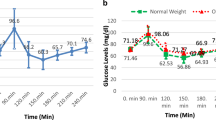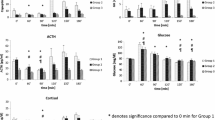Abstract
Objectives
The glucagon stimulation test is a reliable alternative test to assess growth hormone and cortisol secretion, but has not been widely used in the elderly population. The aim of this study was to evaluate growth hormone and cortisol secretion using the glucagon stimulation test in an elderly population without known hypothalamic-pituitary disease and to correlate growth hormone and cortisol peaks with age (less than or greater than 80 years) and body mass index.
Methods
Forty-two subjects (67–88 years) from the geriatric ambulatory unit were submitted and 41 subjects completed the glucagon stimulation test.
Results
Median growth hormone peak was 5.99 μg/L and median cortisol peak was 21.6 μg/dL. Growth hormone peak was >3 µg/L in 73.2%, and cortisol peak was >18 µg/dL in 65.8% of patients. There was a statistically significant positive correlation between the growth hormone peak and the cortisol peak. The cortisol peak was significantly different between subjects stratified by growth hormone peak of < or >3 μg/L (15.7 and 21.8 μg/dL, respectively). There was a statistically significant difference in cortisol peak according to age < or > 80 years (22.4 and 18.5 µg/dL, respectively). Considering lower cut-offs recently proposed for growth hormone peak (1.0 μg/L for overweight subjects) and cortisol peak (9.1 μg/dL), only two patients had a growth hormone peak below this value, and all patients had preserved cortisol secretion.
Conclusions
We did find a positive correlation between growth hormone and cortisol peaks in the glucagon stimulation test in the elderly, confirming the capacity of the glucagon stimulation test to stimulate both axes. According to the new proposed cut-points for growth hormone and cortisol, we had 95% of normal growth hormone and 100% of normal cortisol responses.


Similar content being viewed by others
References
R. Giordano, G. Aimaretti, F. Lanfranco, M. Bo, M. Baldi, F. Broglio, R. Baldelli, S. Grottoli, E. Ghigo, E. Arvat, Testing pituitary function in aging individuals. Endocrinol. Metab. Clin. N. Am. 34(4), 805–906 (2005)
A. Iranmanesh, F. Lizarralde, J.D. Veldhuis, Age and relative adiposity are specific negative determinants of the frequency and amplitude of growth hormone (GH) secretory bursts and the half-life of endogenous GH in healthy men. J. Clin. Endocrinol. Metab. 73(5), 1081–1088 (1991)
A.A. Toogood, S.M. Shalet, Ageing and growth hormone status. Baillière’s Clin. Endocrinol. Metab. 12(2), 281–296 (1998)
H. de Boer, G.J. Blok, E.A. Van der Veen, Clinical aspects of growth hormone deficiency in adults. Endocr. Rev. 16(1), 63–86 (1995)
H.S. Chahal, W.M. Drake, The endocrine system and ageing. J. Pathol. 211(2), 173–180 (2007)
E. Ferrari, L. Cravelllo, B. Muzzoni, N. Albertelli, L. Cravello, M. Fioravanti, S.B. Solerte, F. Magri, Age-related changes of the hypothalamic-pituitary-adrenal axis: pathophysiological correlates. Eur. J. Endocrinol. 144(4), 319–329 (2001)
J.D. Veldhuis, A. Asharma, F. Roelfsema, Age-dependent and gender-dependent regulation of hypothalamic-adrenocorticotropic-adrenal axis. Endocrinol. Metab. Clin. N. Am. 42, 201–225 (2013)
D.M. Cook, K.C.J. Yuen, B.M.K. Biller., S.F. Kemp, M.L. Vance, American association of clinical endocrinologists medical guidelines for clinical practice for Growth hormone use in growth-hormone deficient adults and transition patients—2009 update. Endocr. Pract. 15(Suppl 2), 1–29 (2009)
K.K.Y. Ho; On behalf of the 2007 GH deficiency consensus workshop participants, Consensus guidelines for the diagnosis and treatment of adults with GH deficiency II: a statement of the GH research society in association with the european society for pediatric endocrinology, lawson wilkins society, european society of endocrinology, Japan endocrine society, and endocrine society of australia. Eur. J. Endocrinol. 157(6), 695–700 (2007)
M.E. Molitch, D.R. Clemmons, S. Malozowski, G.E. Merriam, M.L. Vance, Evaluation and treatment of adult growth hormone deficiency: an endocrine society clinical practice guideline. J. Clin. Endocrinol. Metab. 96(6), 1587–1609 (2011)
S.K. Grinspoon, B.M.K. Billler, Laboratory assessment of adrenal insufficiency. J. Clin. Endocrinol. Metab. 79(4), 923–931 (1994)
E. Erturk, C.A. Jaffe, A.L. Barkan, Evaluation of the integrity of the hypothalamic-pituitary-adrenal axis by insulin hypoglycemia test. J. Clin. Endocrinol. Metab. 83(7), 2350–2354 (1998)
K.C.J. Yuen, B.M.K. Biller, M.E. Molitch, D.M. Cook, Is lack of recombinant growth hormone (GH)-releasing hormone in the United States a setback or time to consider glucagon testing for adult GH deficiency? J. Clin. Endocrinol. Metab. 94(8), 2702–2707 (2009)
F.L. Conceição, A. Costa e Silva, A.J.L. Costa, M. Vaisman, Glucagon stimulation test for the diagnosis of GH deficiency in adults. J. Endocrinol. Invest. 26, 1065–1070 (2003)
E. Micmacher, R., P. Assumpção, R., G. Redorat, L., D. Spina, I.C. Cruz, C.A. Silva, M. Vaisman, F.L. Conceiçao, Growth hormone secretion in response to glucagon stimulation test in healthy middle-aged men. Arq. Bras. Endocrinol. Metab. 53(7), 853–859 (2009)
A.B.W. Tavares, I.A. Seixas-da-Silva, D.H.S. Silvestre, C.M. Paixão, M. Vaisman, F.L. Conceição, Potential risks of glucagon stimulation test in elderly people. Growth Horm. IGF Res. 25, 53–56 (2015)
J.M. Gómez, R.M. Espadero, F. Escobar-Jiménez, F. Hawkins, A. Picó, J.L. Herrera-Pombo, E. Villardel, A. Durán, J. Mesa, E. Faure, A. Sanmarti, Growth hormone release after glucagon as a reliable test of growth hormone assessment in adults. Clin. Endocrinol. 56, 320–334 (2002)
K.C.J. Yuen, Glucagon stimulation testing in assessing for adult growth hormone deficiency: current status and future perspectives. ISRN Endocrinol. 2011, 608056 (2011)
A.A. Toogood, S.M. Stewart, Hypopituitarism: clinical features, diagnosis, and management. Endocrinol. Metab. Clin. N. Am. 37(1), 235–261 (2008)
K.S. Leong, A.B. Walker, I. Martin, D. Wile, J. Wilding, I.A. MacFarlane, An audit of 500 subcutanteous glucagon stimulation stimulation tests to assess growth hormone and ACTH secretion in patients with hypothalamic-pituitary disease. Clin. Endocrinol. 54, 463–468 (2001)
L.E. Dichtel, K.C.J. Yuen, M.A. Bredekka, A.V. Gerweck, B.M. Russell, A.D. Riccio, M.H. Gurel, P.M. Sluss, B.M. Biller, K.K. Miller, Overweight/obese adults with pituitary disorders require lower peak growth hormone cutoff values on glucagon stimulation testing to avoid overdiagnosis of growth hormone deficiency. J. Clin. Endocrinol. Metab. 99(12), 4712–4719 (2014)
K.C.J. Yuen, M.M.K. Biller, L. Katznelson, S.A. Rhoads, M.H. Gurel, O. Chu, V. Corazzini, K. Spiller, M.B. Gordon, R. Salvatori, D.M. Cook, Clinical characteristics, timing of peak responses and safety aspects of two regimens of the glucagon stimulation test in evaluation growth hormone and cortisol secretion in adults. Pituitary 16, 220–230 (2013)
H. Diri, Z. Karaca, Y. Simsek, F. Tanriverdi, A. Unluhizarci, F. Kelestimur, Can a glucagon stimulation test characterized by a lower GH cut-off value be used for the diagnosis of growth hormone deficiency in adults? Pituitary 18, 84–92 (2015)
J.R. Wilson, A.L. Utz, J.K. Devin, Effects of gender, body weight, and blood glucose dynamics on the growth hormone response to the glucagon stimulation test in patients with pituitary disease. Growth Horm. IGF Res. 26, 24–31 (2016)
E. Arvat, R. Giordano, L. Gianotti, F. Broglio, F. Camanni, E. Ghigo, Neuroendocrinology of the human growth hormone-insulin-like growth factor I axis during ageing. Growth Horm. IGF Res. 9, 111–115 (1999)
A.A. Toogood, P.A. O’Neill, S.M. Shalet, Beyond the somatopause: growth hormone deficiency in adults over the age of 60 years. J. Clin. Endocrinol. Metab. 81, 460–465 (1996)
A. Rahim, A.A. Toogood, S. Shalet, The assessment of growth hormone status in normal young adult males using a variety of provocative agents. Clin. Endocrinol. 45, 557–562 (1996)
G. Aimaretti, C. Baffoni, L. DiVito, S. Bellone, S. Grottoli, M. Maccario, E. Arvat, F. Camanni, E. Ghigo, Comparisons among old and new provocative tests of GH secretion in 178 normal adults. Eur. J. Endocrinol. 142(4), 347–352 (2000)
A.H. Hamrahian, K.C.J. Yuen, M.G. Gordon, K.J. Pulaski-Liebert, J. Bena, B.M.K. Biller, Revised GH and cortisol cut-points for the glucagon stimulation test in the evaluation of GH and hypothalamic-pituitary-adrenal axes in adults: results from a prospective randomized multicentre study. Pituitary 19, 332–341 (2016)
K.C.J. Yuen, N.A. Tritos, S.L. Samson, A.R. Hoffman, L. Katznelson, American association of clinical endocrinologists, american college of endocrinology disease state clinical review: update on growth hormone stimulation testing and proposed revised cut-point for the glucagon stimulation test in the diagnosis of adult growth hormone deficiency. Endocr. Pract. 22, 1235–1244 (2016)
A.R. Hoffman, G.P. Ceda, IGFs and aging: is there a rationale for hormone replacement therapy? Growth Horm. IGF Res. 14, 296–300 (2004)
C. Berg, T. Meinel, H. Lahner, A. Yuece, K. Mann, S. Petersenn, Diagnostic utility of the glucagon stimulation test in comparison to the insulin tolerance test in patients following pituitary surgery. Eur. J. Endocrinol. 162, 477–482 (2010)
Z. Karaca, A. Lale, F. Tanriverdi, M. Kula, K. Unluhizarci, F. Kelestimur, The comparison of low and standard dose of ACTH and glucagon stimulation tests in the evaluation of hypothalamo-pituitary-adrenal axis in healthy adults. Pituitary 14, 134–140 (2011)
R.M. Sapolsky, L.D. Krey, B.S. Mc Ewen, The neuroendocrinology of stress and aging: the glucocorticoid cascade hypothesis. Endocr. Rev. 7, 284–301 (1986)
R.H. Rao, G.S. Spathis, Intramuscular glucagon as a provocative stimulus for the assessment of pituitary function: growth hormone and cortisol responses. Metabolism 36, 658–663 (1987)
Acknowledgments
The authors thank Luiz Guilherme Kraemer de Aguiar, Ph.D. for assistance with the statistical analysis.
Author information
Authors and Affiliations
Corresponding author
Ethics declarations
Conflict of interest
The authors declare that they have no competing interests.
Ethical approval
Ethical approval for this study was obtained in accordance with the ethical standards of the institutional and/or national research committee and with the 1964 Helsinki declaration and its later amendments or comparable ethical standards.
Informed consent
Informed consent was obtained from all individual participants included in the study.
Rights and permissions
About this article
Cite this article
Tavares, A.B.W., Seixas-da-Silva, I.A., Silvestre, D.H.S. et al. Growth hormone and cortisol secretion in the elderly evaluated using the glucagon stimulation test. Endocrine 56, 317–324 (2017). https://doi.org/10.1007/s12020-017-1275-8
Received:
Accepted:
Published:
Issue Date:
DOI: https://doi.org/10.1007/s12020-017-1275-8




